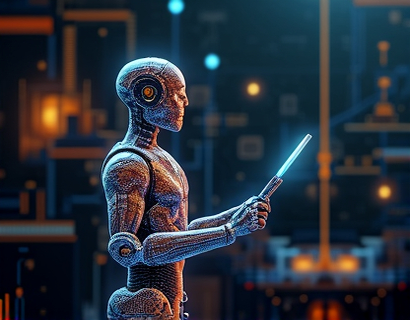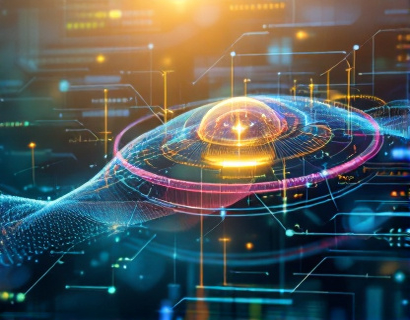Transforming Digital App Ecosystems: The Synergy of Crypto and AI
The integration of cryptocurrency and artificial intelligence is ushering in a new era of digital innovation, fundamentally altering the way we interact with apps and services online. This fusion of technologies is not just a trend but a transformative force that is redefining the digital landscape. As we delve into this topic, it's essential to understand the individual roles of cryptocurrency and AI before exploring their synergistic impact on digital app ecosystems.
Cryptocurrency: The Backbone of Decentralized Finance
Cryptocurrency, often referred to as digital or virtual currency, operates on a decentralized network using blockchain technology. This technology ensures transparency, security, and immutability in transactions, eliminating the need for intermediaries such as banks. The most well-known cryptocurrency, Bitcoin, was launched in 2009 by an unknown entity using the pseudonym Satoshi Nakamoto. Since then, thousands of alternative cryptocurrencies, or altcoins, have emerged, each with unique features and use cases.
The adoption of cryptocurrency extends beyond mere digital currency. It has become a medium for decentralized finance (DeFi), enabling peer-to-peer lending, borrowing, and trading without traditional financial institutions. Smart contracts, self-executing contracts with the terms directly written into code, are a cornerstone of DeFi, automating and securing financial transactions.
Artificial Intelligence: The Brain Behind the Curtain
Artificial intelligence, on the other hand, refers to the simulation of human intelligence processes by machines, particularly computer systems. These processes include learning (the acquisition of information and rules for using it), reasoning (using rules to reach approximate or definite conclusions), and self-correction. AI technologies such as machine learning, natural language processing, and computer vision are rapidly advancing, finding applications in various sectors from healthcare to finance.
Machine learning, a subset of AI, involves algorithms that can learn from and make predictions based on data. Supervised learning, unsupervised learning, and reinforcement learning are key types of machine learning, each with distinct approaches to data analysis and pattern recognition. The ability of AI to process vast amounts of data and identify complex patterns makes it an invaluable tool for enhancing digital experiences.
Synergy of Crypto and AI: A New Paradigm
The convergence of cryptocurrency and AI is creating a new paradigm in digital app ecosystems. This synergy leverages the strengths of both technologies to offer more secure, efficient, and personalized user experiences. Let's explore some of the key areas where this fusion is making a significant impact.
Enhanced Security Through Blockchain and AI
Security is a paramount concern in the digital world, and the combination of blockchain and AI is revolutionizing how we approach it. Blockchain's inherent security features, such as cryptographic hashing and decentralized consensus, provide a robust foundation. AI enhances this by detecting and mitigating threats in real-time.
For instance, AI-powered security systems can analyze patterns in transaction data to identify anomalies that may indicate fraudulent activity. These systems can adapt and learn from new threats, providing a dynamic and proactive defense mechanism. Smart contracts can also be programmed with AI-driven logic to automatically enforce security protocols, ensuring that transactions meet predefined safety standards.
Personalized User Experiences
AI's ability to process and analyze large datasets makes it an ideal tool for creating personalized user experiences. In the context of digital app ecosystems, AI can tailor content, recommendations, and services based on individual user preferences and behaviors. This personalization is further enhanced by blockchain, which ensures that user data is securely stored and managed, giving users greater control over their information.
For example, a streaming service can use AI to analyze a user's viewing history and preferences, recommending content that aligns with their interests. Blockchain can securely store and manage user profiles and preferences, ensuring that this data is not only personalized but also private and tamper-proof.
Decentralized Applications (DApps)
Decentralized applications, or DApps, are a prime example of the crypto-AI synergy in action. DApps run on a blockchain network and are governed by smart contracts, eliminating the need for a central authority. AI can enhance DApps by providing intelligent and adaptive functionalities.
Consider a decentralized finance (DeFi) platform that uses AI to optimize trading strategies and risk management. The AI algorithms can analyze market data, predict trends, and automate trading decisions, all while operating within the secure and transparent framework of the blockchain. This combination not only enhances the efficiency of financial operations but also democratizes access to sophisticated investment tools.
Supply Chain Transparency and Efficiency
Supply chain management is another area where the integration of crypto and AI is making a significant impact. Blockchain provides a transparent and immutable ledger for tracking goods from production to delivery, ensuring authenticity and reducing fraud. AI can optimize various stages of the supply chain, from inventory management to logistics planning.
For instance, AI algorithms can predict demand patterns and optimize inventory levels, reducing waste and improving efficiency. Smart contracts can automate payments and ensure that all parties in the supply chain adhere to agreed-upon terms. This not only streamlines operations but also builds trust among stakeholders, as all transactions are recorded and verifiable.
Identity and Authentication
Digital identity and authentication are critical components of any app ecosystem. The combination of blockchain and AI offers a robust solution to these challenges. Blockchain can provide a decentralized and secure way to store and manage identity data, while AI can enhance authentication processes through biometric analysis and behavioral patterns.
For example, AI-driven biometric systems can use facial recognition or fingerprint scanning to verify user identities with high accuracy. These systems can be integrated with blockchain to create a secure and tamper-proof identity verification process, reducing the risk of fraud and enhancing user trust.
Challenges and Considerations
While the potential of combining cryptocurrency and AI is vast, there are several challenges and considerations to address. Scalability remains a significant issue for blockchain technology, as many networks struggle to handle high transaction volumes efficiently. AI models require substantial computational resources and data, which can be costly and energy-intensive.
Regulatory frameworks are also evolving to keep pace with these technologies. Ensuring compliance with data protection laws and financial regulations is crucial for the widespread adoption of crypto-AI solutions. Additionally, the ethical implications of AI, such as bias and privacy concerns, must be carefully managed to build public trust.
Future Prospects
The future of digital app ecosystems is bright, with the continued convergence of cryptocurrency and AI promising even more innovative solutions. As technology advances, we can expect to see more sophisticated AI algorithms integrated into blockchain networks, leading to more intelligent and autonomous systems.
The rise of Web 3.0, a decentralized internet powered by blockchain, AI, and other emerging technologies, is on the horizon. This new web will offer a more secure, private, and user-centric internet experience, fundamentally changing how we interact with digital services. The potential for decentralized autonomous organizations (DAOs) and community-driven platforms is also exciting, as they empower users to participate in the governance and development of digital ecosystems.
In conclusion, the fusion of cryptocurrency and AI is not just a technological advancement but a transformative force that is reshaping the digital landscape. By enhancing security, personalization, and efficiency, these technologies are paving the way for a more connected and empowered user base. As we continue to explore and innovate at the intersection of crypto and AI, the possibilities for the future of digital app ecosystems are endless.











































